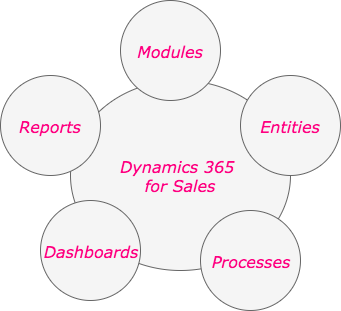Microsoft Dynamics 365 for Sales basics
In this tutorial, we are going to learn about Microsoft Dynamics 365 for Sales basics like what are the different elements present in Dynamics 365 for Sales. Microsoft Dynamics 365 is the next generation of intelligent business application delivered in the Cloud. Before learning Dynamics 365, it is required to learn about the standard elements that helps to achieve it’s functionalities. Microsoft Dynamics 365 for Sales (Dynamics CRM) is comprised with many elements like Modules, Entities, Processes, Reports and Dashboards.

Microsoft Dynamics 365 modules
Modules are a grouping of functionalities that serve a specific business scope. The standard modules provided by Microsoft are Sales Module, Service Module and Marketing module.
- Sales Module : Sales module provides the tools for sales team to manage Leads and Opportunities..
- Service module : Service module focuses on tracking activities related to existing customer interactions.
- Marketing module : Marketing module deals with engaging existing and potential customers by facilitating marketers to plan, execute, and gauge the success of campaigns engaging customers across multiple channels.
Microsoft Dynamics 365 for Sales: Entities
Entities in Dynamics 365 are containers used to model, store and manage business data. Through entities, the platform allows users to structure data, create relationships, and manage actions.
Each entity is comprised with number of attributes like Name Attribute, ID attribute, Description attribute and many more. These attributes are the data items of a particular type and stored in the database. Each one of these attributes can be displayed on an Entity form as a field. Entities are of three type :
- System Entities.
- Business Entities and
- Custom Entities.
Microsoft Dynamics 365 for Sales: Process
Microsoft Dynamics 365 provides consistent business processes, helping Dynamics users to focus more on performing their regular work and less on remembering what needs to be done at each step on the way. A process in Dynamics 365 can be created and manage with out single line of code, this bring ease of use and stat up to date with the business.
In Microsoft Dynamics 365, we have four types of Processes, they are
- Dialogs : Dialogs in Dynamics CRM are used to create a graphical representations that helps user to collect data, create new records, and guide the user through a set of actions to be performed based on various answers from a customer.
- Workflows : Workflows are the automated process used in business process to send Email, assign a task, update a field on rule criteria or action based criterial.
- Actions : An Action in Dynamics CRM is a custom process that allows user to create custom message..
- Business Process Flows : Business Process Flows are visual elements that allow a system user to input required data, by grouping the required fields together at the top of the screen.
Microsoft Dynamics 365 for Sales: Dashboards
Dashboards in Microsoft Dynamics 365 are the visual components that allow users quick access to aggregated data in the system. In Dashboards we have various elements like charts, grids, IFRAMES, and web resources.
Microsoft Dynamics 365 for Sales: Reports
Microsoft Dynamics 365 includes Report wizard that can be used to generate system reports with out using XML and SQL based queries.
